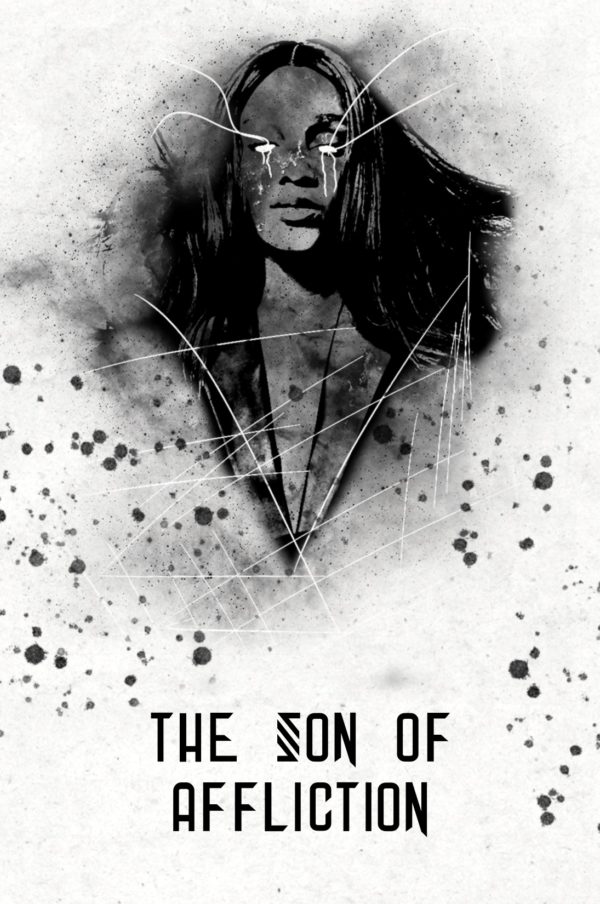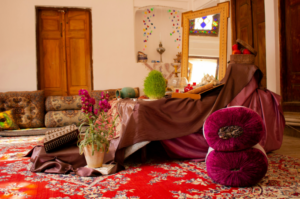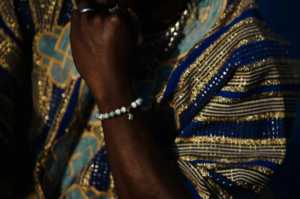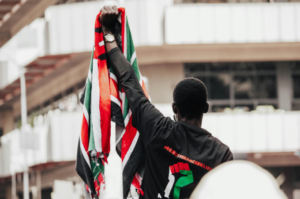
“I was there in the fire, the flames that kindled the world. There was darkness, there was emptiness, there was nothing; except me, that is.”
— Doreen, Private Journals 1806.
***
On 71 Adelabu Street, Surulere, is a two-storey house split in half. Above is an apartment that gathers dust, mould and cobwebs. Underneath is a shop with Mama D’s All-Purpose Shop written in neon red.
On entering, to the casual observer, it may look and feel like a typical shop with clearly labelled products lined in neat aisles. There is a young girl at the counter with blue-green dreads clad in a red uniform. She might smile and wave as the casual observer smiled and waved back. Then the casual observer might walk through the whole shop, settle on buying dried crayfish and move on to their next destination, wondering about the strange hair colour.
But we are not casual observers.
If you look closely, one thing is evidently wrong about Mama D’s All-Purpose Shop. There are too many doors.
Try it. Amuse yourself and count.
1, 2,
13,
…62?
How could you have lost count?
Wriggle your fingers and try counting again. You lose count, again. But don’t worry, there is strong magic at work here; magic that seeps into your mind, muddling it so you can never really understand the true dimensions of the shop or the lonely house on 71 Adelabu Street. If they don’t want you to find them, you never will. Assemble a team of a thousand men, pull them impossibly into the shop, and still, you’d fail to understand.
The shop is far bigger than you could ever imagine and on the other side of the door directly behind the bright smiling woman with coloured hair, a meeting is going on in a dimly lit cave.
The Witches of Auchi are all in blood-red wrappers with swirling white marks on their skin, inscribed in an ancient language lost to humanity. They all have red sashes tied on their heads, all except the leader; her head is bare — she thinks the sashes are silly. Twelve of them line the long table. Candles are the only source of light in the cave. There is a cat as black as midnight with eyes the brown of wood, eyes that are too intelligent, too sentient for a mere cat. It sits on the table in front of the leader, an amused look on its face as its back is slowly rubbed.
They all look bored listening to a man speak. Customers don’t really have to kneel. But they had taken one look at his mouse-like stature and decided they would let his knees have it.
‘Speak!,’ says the leader, Doreen, a mountain of a woman. The cat, Midnight, scurries off to where shadows hide.
Doreen has lived far longer than anyone else in the coven, anyone alive. Her voice and her eyes are old. She has watched kingdoms rise and fall, she has seen men born, seen men die; some of them she’s killed herself.
Hearing the man talk, she is seriously contemplating adding another to her long list.
“O, great ones,” says the man, arms stretched out like an actor about to launch a soliloquy.
The witches groan.
“My name is Túndé Adémọ́lá. I learnt about you from my late uncle’s diaries, and I have come all the way from Ogun State to Lagos, seeking wisdom, seeking help, from the great Witches of Auchi. I come from a long line of kings and rulers. In fact, my father —”
“My guy, you don’t really have to say all these ones. Just tell us what you want so you can do and go.” Teni is the slender witch. She is standing on Doreen’s right hand.
“But,” says the man as he raises his head, “in Uncle Bólú’s diaries, he said to always approach the witches with respect, citing your entire line and kneeling, never looking at their faces.”
The witches all look at each other, whispering in confusion. Looking at the man closely, one of the witches faintly recalls another mouse-faced little man from seventy years ago. She also remembers them playing a joke on him, telling him to kneel while telling them all about his family line from beginning to end before he spoke.
Doreen smiles with recollection: “I remember that man. We were joking, my dear. Nowadays, a simple ‘Good evening’ is fine.”
Túndé looks at all of them as if for the first time. “So, I can stand up now? I won’t lie, this ground has been paining my —”
“No,” Doreen cut in, still smiling, “keep kneeling. Our…” she says, looking at her sisters, “…magic will not work if you stand.” She looks at him sadly and shrugs in a way that says, I don’t make the rules, sorry.
Túndé nods, accepting this as fact. “I want a —”
“Love charm?” A voice from behind cuts him off. He spins around to see a girl behind him. She is grinning from ear to ear and fingering blue-green locks.
“Most men come to us for love charms. I don’t know why.”
“Nobody tells me anything these days,” she mutters to herself, “not since I burned the old shop down — by mistake…But sha, do you want a love charm? We make the best love charms in Lagos, even Nigeria sef.”
Everyone turns towards Doreen, slightly irritated by the interruption. But Doreen is smiling.
She remembers finding the girl in the dirt years ago at night, a little baby in the outskirts of the village wrapped in nothing but tattered nylon bag. After Doreen turned everyone in the village into frogs, she named the child Nkechinyere— “The one the gods gave” and brought her to the Coven, raising her as one of their own. She is strange, yes, but she means well.
Mostly.
“Chichi, you should be watching the store.”
“I got bored. When will I become a real witch so I can handle charms and ingredients and spells?”
“Last time you handled charms, you came close to killing everyone in Edo state…and Ondo. Go back to the counter sweetie.”
Doreen motions to Túndé to continue.
“It’s about my son.”
“He’s sick?” Lizzy, a witch wearing glasses, asks.
The man hesitates. But then nodded sadly. “Yes…very sick.”
“Malaria?” One witch offers.
“Hepatitis?” another pipes in.
“AIDS?” says a witch with a snake tattoo on her neck.
“Sisters!” Returning her gaze to Tunde, “What is your son’s affliction?”
Túndé begins to cry. “He’s…My son. He’s… he is gay.”
Doreen stirs at the man. Her face is unreadable. “You want a charm to kill him?”
Túndé considers the question for a moment but then shakes his head. “Well, he’s my first son…and he’s also a fellow Arsenal fan so…”
“So, what do you want from us, Túndé?”
“I was thinking,” Túndé scratches his head, “if maybe there was a way, you could, you know, turn him back. Shebi, you people, can do that?”
Doreen looks at him for a moment.
Then another.
“Yes.” She says finally. “Yes, we can.”
He starts out sayin, “Thank G —” but catches himself as he feels the icy glare from the witches. “Thank goodness,” he quickly corrects himself.
“We will give you a charmed bracelet. Touch your son while you have it on, and your problems will be solved.”
“Just like that?” Túndé asks, amazed.
“Just like that.”.
“Where do I wear the bracelet?” Túndé askes.
Doreen stares blankly at him. “On my head.”
“Okay, okay” he giggles. “What do I owe you?”
Doreen leans forward. “Well, good products demand high prices and —”
“I’ll do it,” he declares, eagerly standing up. “I’ll kill my mother. It’ll be hard o, but I won’t lie, I’m willing to make the sacrifice and leak her blood into a keg for you all. She’s been making all these small small jokes about me being short and jobless, then that my goat wife will now laugh at me on top. She’s even old too so killing her won’t be hard, I’ll just…” he trailed off as he see the disgust on their faces.
“Bro…” Tẹni says, “that’s your mother.”
“I was going to say,” Doreen chimes in, “that since good products demand high prices, we will charge 100K for the charm — Why would we want your mother’s blood? What would we even use it for? We are witches, not vampires.”
“Oh. I just thought….” His voice trails off in embarrassment.
“Just bring the money so you can leave us.”
Túndé pats his pockets. “I don’t really have cash on me like that.”
Doreen sighs and snaps her fingers as one of the other witches hands her a small machine.
“Don’t worry. We have POS. Savings or current?”
***
Later in the evening, Tẹni corners Doreen in a quiet spot.
“Does the charm really…”
“It will solve his problems,” Doreen replies, avoiding Tẹni’s eyes, whispering, “just not in the way he thinks. The bracelet is from East Africa, a bonding charm. I found it during my time there. It gives the wearer a deep understanding of the first person touched. A bonding charm is an empathy talisman common among rulers seeking to enlarge their capacity to love the people and understand their plight. It opens the human heart to compassion and understanding.
“Quick thinking,” Tẹni whispers back.
[Learn more about The Witches of Auchi Series here. Episode Two drops on Thursday, Oct. 10.]
All art by Anthony Azekwoh









The Dinner Date & The Battle Line: Episode 6 and 7 | The Witches of Auchi Series | Anthony Azekwoh September 07, 2020 14:04
[…] more about The Witches of Auchi Series here. Catch up on Episode One, Two, Three, four, and five here and here and here, and here, and here. In a few weeks, come back for Witches of Auchi […]